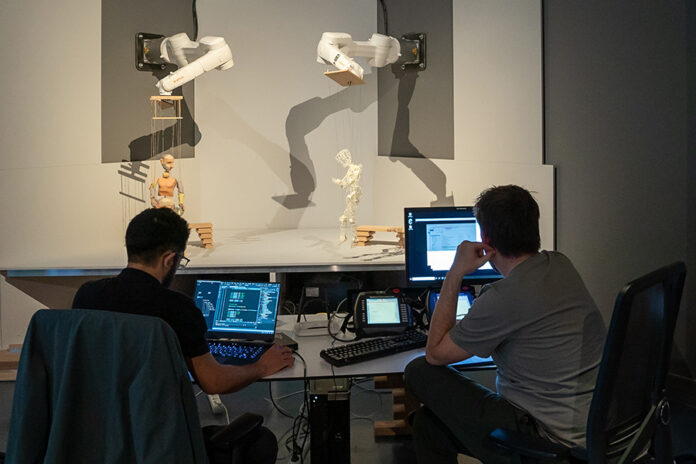
08.06. – 12.09.2021.
PUPPETS ON A STRING?
„Working in and on the future“ at the Ars Electronica Center Linz: Is Artificial Intelligence going to tell us, what we have to do and what we should avoid?
Pinocchio hangs on the strings of a robot arm. The robot is just learning the delicate high art of puppetry. Pinocchio is a joint project between the Ars Electronica Futurelab and the Creative Robotics Institute at Linz Art University. In this project, Kerstin Blätterbinder, Stefan Mittlböck, Erwin Reitböck, Peter Freudling and Otto Naderer are jointly investigating how robots can acquire highly complex human abilities and artistic skills. The project is part of the exhibition„Working in and on the future“ at Linz’s Ars Electronica Center. Pinocchio simultaneously raises what is probably one of the most burning existential questions regarding the future relationship between humans and machines. Namely: Who will control whom in the future?
Digital assistance systems are taking control of ever larger areas of everyday life and the world of work. From road traffic to logistics or industrial plant control. They are spreading so successfully mainly because they have hardly had to face any socio-political discourse so far, but are rather driven by economic benefit and profit maximization dynamics.
The exhibition„Working in and on the future“ presents impressive examples of what could already determine our everyday lives in the near future. One of the exhibition’s thematic clusters at the Ars Electronica Center is devoted to future forms of human-machine collaboration. Exoskeletons are already helping warehouse workers with heavy lifting tasks. Occupational health is a convincing argument for the use of such machines. But what if they were also equipped with control software that immediately gave these “warehouse soldiers” the direction of travel? Technically, that would probably no longer be a major challenge. This is a temptation that companies such as Amazon, which are notoriously known for exploiting employees, optimizing processes and maximizing profits, could easily succumb to.
This example makes visible that a broad fundamental rights debate about the relationship between humans and AI is of utmost urgency. The “Every Human” initiative launched by Ferdinand von Schirach therefore also calls for a new fundamental right to protect humans from the effects of artificial intelligence:
“Every human being has the right, that algorithms that affect him have to be transparent, verifiable and fair. Essential decisions must be made by a human being.”, von Schirach proposes as wording for a new article in the European Convention on Human Rights. Given the rapid pace of technological development, we probably don’t have much time left for this fundamental rights debate. It also affects another thematic cluster of the exhibition: “Data is the New Oil.” The international art collective Collective NoTopia presents their project “AIOracle 2081”, which is based on a provocative game arrangement. One enters a scanner room and a voice reads the rules:
“Welcome to AI Oracle. By entering this cube you agree to our terms of scanning all your existing data and selecting a future job for you. Welcome to the future!”.
Working in and on the future
08.06. – 12.09.2021
Ars Electronica Center
Ars-Electronica-Straße 1
4040 Linz
https://ars.electronica.art











